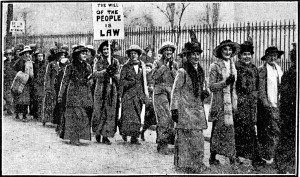5 Reasons Housing is a Feminist Issue #LivingRent

Today is International Women’s Day, an important time for highlighting campaigns which promote gender equality. The struggle for better housing has historically been lead by women, with Mary Barbour and her well organised army of neighbours leading the way in the 1915 rent strikes. One hundred years later women continue to challenge the rich and powerful to demand better housing; the Focus E15 mums from London who tour the UK inspiring others, are just one example of the continuation of this legacy.
High quality, affordable housing with secure tenancies and rent control would improve the lives of the vast majority of Scottish people, but it is an issue which is particularly important for women.
There are five key reasons why the campaign for a living rent is vital for the liberation of women.
1. Lack of affordable housing options puts women at risk of domestic abuse, and could prevent women who experience abuse from leaving.
The office for national statistics in 2013 suggested that 31% of women have experienced domestic abuse from the age of 16. Domestic abuse is well known to be under-reported, and the number of women who experience this could be much higher. For many, leaving a violent or controlling partner is difficult and a lack of affordable safe housing options is a key barrier to women leaving. Control of finances can be an aspect of domestic abuse, and there are many occasions where women do not have access to money of their own. Moving house is usually very expensive, and money has to be found for deposits and a first month’s rent.
There are a number of non-financial reasons that women may not leave an abusive partner. Affordable, secure housing alone would not end domestic abuse, however it could make leaving an abusive partner much easier.
2. An inability to establish oneself in a local community affects women more than men.
Women are much more likely to participate in their local communities, whether that be through using services like playgroups, libraries and community centres or becoming involved in community councils. Our current tenancy regime gives private tenants very little security in their homes, and this can affect our ability to establish ourselves as members of a local community. This is more likely to impact negatively on women as historically women have depended more on local support networks.
By fighting for better security of tenure, you are helping to support women to keep their local support networks and participate in their communities.
3.Lack of a secure home has more adverse effect on those with caring responsibilities.
Women are far more likely to have caring responsibilities, whether this involves their children or elderly relatives.
Not having a home you know you can stay in is a problem for all tenants, however for those with caring responsibilities the situation is even more dire. Being told you have to move, with all the associated expense and stress is a much more difficult experience for those who care for others.
4. Higher rents make up a larger proportion of women’s wages.
We may have had equal pay legislation for almost half a century, but the pay gap still persists, and women are still more likely to be concentrated in low paid employment. Privately rented homes are the most expensive type of housing, and high rents are a higher proportion of women’s wages, given the persistent pay gap. Rent controls would put more money into the pockets of the poorest members of society, many of whom are women.
5. We all need a decent place to live. Secure affordable housing would benefit everyone.
People are oppressed in all kinds of ways not just as a result of their gender.
Fighting to improve private rented housing is important as the most vulnerable women who experience multiple forms of disadvantage are most often concentrated in private rented housing. For example, fighting for better housing is important for migrant workers, who are more likely to live in the private rented sector and experience the worst aspects of renting. Secure housing is important for LGBT* people who are more likely to have left home at a young age, and more likely to lack parental support. Fighting for better housing is more important for disabled women who often face significant barriers to finding suitable accommodation.
Affordable high quality housing will not end racism, homophobia or ableism, but it is a fundamental human need that those with privilege often take for granted.
Take Action, with the Living Rent Campaign!
23 March marks the beginning of a week of action for better housing in Scotland. It’s vital that as many people as possible join us to demand the housing we all deserve.
The Facebook event for the week is here and there are events taking place across Scotland.
One hundred years ago, the women of Glasgow marched and went on strike to demand better quality housing and an end to slum landlords. Today the private rented sector is growing, and rents are rising much faster than wages. We are in danger of re-creating the conditions our forebears worked so hard to end.
Join us this March as we refuse to go back a hundred years, for the liberation of women, and everyone else.
- This is a cross post from the Scottish campaign for better housing for renters livingrent.org.



Leave a Reply